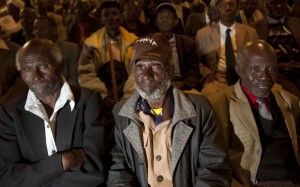The British government argued in court last year that too much time had passed for victims to claim legal compensation for the human rights abuses British officials meted out during Kenya’s Mau Mau rebellion 60 years ago.
But here, in part, is what I wrote to disabuse the government of this unconscionable and unsustainable defense:
If the British government has any regard for what little redeeming value its legacy of colonialism retains, it would consider it a moral imperative to move post-haste to negotiate a victims’ fund with the Kenyan government, from which all victims can seek relatively fair compensation … in Kenya.
Incidentally, this would (and should) not absolve the government of the categorical imperative to pursue and prosecute every British official implicated in these human rights abuses…
Accordingly, I fully expect Britain, at long last, to do the right thing: apologize and pay, pursue and prosecute!
(“Reparations for British Colonialism,” The iPINIONS Journal, July 18, 2012)
 This is why I was heartened when the High Court ruled in short order that the government’s defense was wholly without merit. But I was even more heartened yesterday when the government finally settled this class-action suit – just as I expected it would do.
This is why I was heartened when the High Court ruled in short order that the government’s defense was wholly without merit. But I was even more heartened yesterday when the government finally settled this class-action suit – just as I expected it would do.
For here, in part, is the extraordinary apology Foreign Secretary William Hague delivered in Parliament for the torture thousands of Kenyans suffered under the boot of British colonial officers:
The British government sincerely regrets that these abuses took place and that they marred Kenya’s progress to independence. Torture and ill-treatment are abhorrent violations of human dignity which we unreservedly condemn.
(London Guardian, June 6, 2013)
 And since I called on the British to not only apologize but also pay, I duly note their concomitant announcement of a victims’ fund. It’s just too bad this fund’s sum of $30 million makes a mockery of the government’s fulsome apology. After all, when divided among the 5000-plus victims, this amounts to an insulting $3000 each; notwithstanding that no amount of money could possibly compensate for their pain and suffering.
And since I called on the British to not only apologize but also pay, I duly note their concomitant announcement of a victims’ fund. It’s just too bad this fund’s sum of $30 million makes a mockery of the government’s fulsome apology. After all, when divided among the 5000-plus victims, this amounts to an insulting $3000 each; notwithstanding that no amount of money could possibly compensate for their pain and suffering.
All the same, now that this precedent has been set, I urge other victims of British colonial abuse to file their claims too … post-haste:
If the High Court were to establish the precedent that victims of colonial-era abuses could seek damages in British courts, I have no doubt that thousands of claimants would show up in London to seek redress from every place on earth that was subjected to British dominion.
In which case the British government would be well-advised to initiate government-to-government settlements of all such cases instead of allowing any of them to proceed to trial – especially with all of the opening of old wounds (on both sides) that would entail.
(“Reparations for British Colonialism,” The iPINIONS Journal, July 18, 2012)
In any event, now that it has apologized and paid, it’s time for the British government to pursue and prosecute. For, just as victims of the Holocaust have had no statute of limitations placed on pursuing and prosecuting their Nazi oppressors, victims of colonial atrocities should have none placed on pursuing and prosecuting their British oppressors.
Related commentaries:
Reparations…